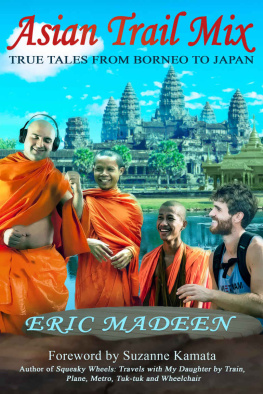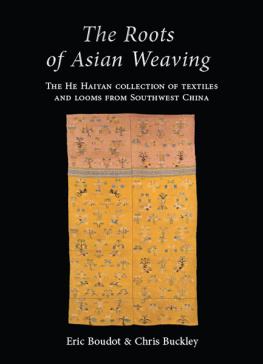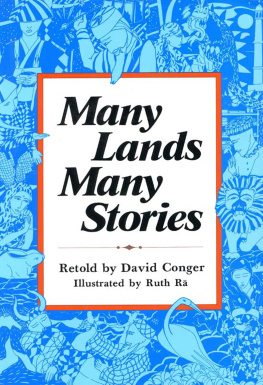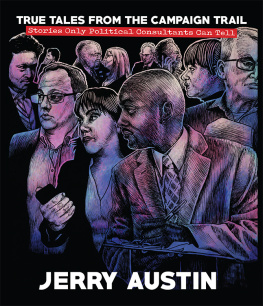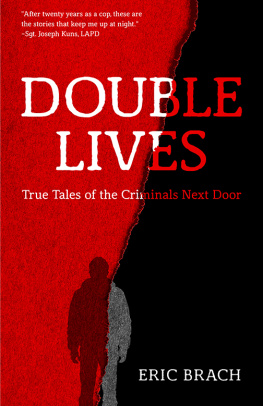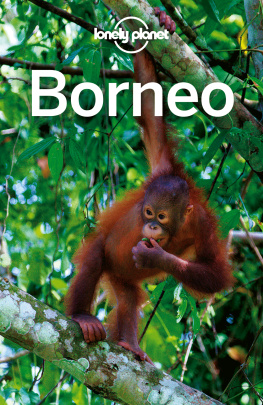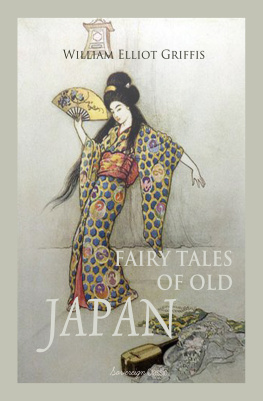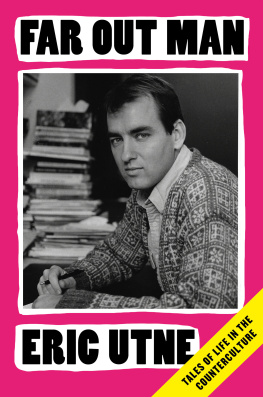Eric Madeen - Asian Trail Mix: True Tales from Borneo to Japan
Here you can read online Eric Madeen - Asian Trail Mix: True Tales from Borneo to Japan full text of the book (entire story) in english for free. Download pdf and epub, get meaning, cover and reviews about this ebook. year: 2021, genre: Detective and thriller. Description of the work, (preface) as well as reviews are available. Best literature library LitArk.com created for fans of good reading and offers a wide selection of genres:
Romance novel
Science fiction
Adventure
Detective
Science
History
Home and family
Prose
Art
Politics
Computer
Non-fiction
Religion
Business
Children
Humor
Choose a favorite category and find really read worthwhile books. Enjoy immersion in the world of imagination, feel the emotions of the characters or learn something new for yourself, make an fascinating discovery.
- Book:Asian Trail Mix: True Tales from Borneo to Japan
- Author:
- Genre:
- Year:2021
- Rating:4 / 5
- Favourites:Add to favourites
- Your mark:
- 80
- 1
- 2
- 3
- 4
- 5
Asian Trail Mix: True Tales from Borneo to Japan: summary, description and annotation
We offer to read an annotation, description, summary or preface (depends on what the author of the book "Asian Trail Mix: True Tales from Borneo to Japan" wrote himself). If you haven't found the necessary information about the book — write in the comments, we will try to find it.
Asian Trail Mix: True Tales from Borneo to Japan — read online for free the complete book (whole text) full work
Below is the text of the book, divided by pages. System saving the place of the last page read, allows you to conveniently read the book "Asian Trail Mix: True Tales from Borneo to Japan" online for free, without having to search again every time where you left off. Put a bookmark, and you can go to the page where you finished reading at any time.
Font size:
Interval:
Bookmark:
Contents
Eric Madeen grew up in the Chicago suburb of Elgin, Illinois. He earned his BA in Journalism from the University of Arizona and MFA in Creative Writing and Literature from San Diego State University. He served as a Peace Corps volunteer in the Rural School Construction Program in francophone Gabon, successfully building a primary school complex, with the diligent help of local men, in the equatorial African village of Djidji (jee-jee). Asian Trail Mix is his first essay compilation. His first novel Water Drumming in the Soul: A Novel of Racy Love in the Heart of Africa was recently rereleased in paperback and ebook. He lives with his family in Yokohama.
Asian Trail Mix
True Tales from Borneo to Japan
ERIC MADEEN
For Julie rockstar and soul sharer extraordinaire
I borrow moonlight
for this journey
of a million miles.
Ihara Saikaku
Japanese poet (164293)
Foreword
Every once in a while, someone will say that travel writing is doomed, that since we have access to images from all over the world, and the capacity to travel just about anywhere wed like, there is no need to read about someone elses experiences. Every once in a while I also hear an argument against travel itself, especially the kind that requires carbon-footprint-inducing trips by airplane. We are told that indulging our wanderlust may endanger the planet. Recently we have learned of the disease-spreading potential of cruise ships. For better or worse, as I write these lines, we are stuck at home and our planet is getting a bit of a rest. Airports and planes are mostly empty due to the COVID-19 pandemic. Nevertheless, many of us are feeling restless, yearning for distant lands and unfamiliar vistas. What better time to escape our daily lives via travel writing?
Eric Madeen, an American who lives in Japan like me (but whom I first met at the Breadloaf Writers Conference in faraway Vermont), has traveled widely and deeply. As a young man, he served in Gabon as a Peace Corps volunteer, an experience which provided fodder for his wonderful first novel. In these richly textured essays, he employs the skills he has honed as a fiction writer an eye for the telling detail, an ear for the choice phrase, a storytellers command of narrative to take the reader along on real-life adventures to various points in Asia.
The best travel writing often incites the urge to travel, and I certainly wish that I could drop in on the orangutan rehabilitation center in Sabah, Malaysia, look around Saigons Cholon Market, or take in the charms of Luang Prabang in Northern Laos after reading Madeens vivid descriptions of these sites. Travel writers can also take us to the places where we have neither the means, nor the motivation to go. I appreciated the vicarious thrill of following Joseph Conrads jungle journey, even while I was glad it was not me, stalled out in the dead of night after a twenty-two-hour jeep ride, swatting at mosquitoes for three hours, waiting [my] turn at a bottleneck of four-foot ruts of muck in a no-mans land called Mawe.
One of the greatest pleasures of travel is the people that we meet along the way. In these pages, as well, Madeen introduces a variety of colorful characters including an enterprising Vietnamese cyclo driver/tour guide, flirtatious monks, a Japanese fortuneteller, a maker of the traditional Okinawan distilled liquor awamori, and software engineers involved in designing robopets, in addition to a few historical figures such as feminist and early Japanese tennis aficionado Raicho Hiratsuka. Though we may not meet these exact same people after following in his footsteps, through his humanity and curiosity, Madeen makes us aware of all of the fascinating people who might be in our midst.
Several of the essays end with an entreaty to sample, try, or experience something, be it the musical fountain on Sentosa Island, or a traditional Thai massage at Wat Po. Although this may not always be possible in real life, we can nevertheless immerse ourselves through indulging in these pages. Here is where I invite you to read on. Savor. Explore.
Suzanne Kamata,
March 19, 2021
Aizumi, Japan
FROM SINGAPORE TO BERAU
In Conrads Wake
M y task which I am trying to achieve is, by the power of the written word, to make you hear, to make you feel. It is, before all, to make you see.
Joseph Conrad
Preparations for the trip had been fraught with anxiety. Not a single person contacted in the sprawling branches of the travel industry could tell the journalist or the photographer how to get to a remote upriver settlement Berau in Kalimantan (Indonesian Borneo), though one enterprising soul offered to find out for an exorbitant fee. Even guidebooks came up short. There were inoculations and confusion as to malaria medicine for some reason not vended in Japan for the nebulous B and C malaria zones ahead. Yet the trip was indeed on.
At last we were bound for Singapore. Our goal was to follow loosely but somewhat literally in the wake of Joseph Conrad, the Polish-born English novelist (1857-1924). I, who also wore the hats of university professor, published novelist, Conrad scholar, and Japan editor of the Joseph Conrad Foundation, had devoured, repeatedly, Conrad's Heart of Darkness while living in the wilds of Gabon as a Peace Corps volunteer in another life. Over the years I read deeply in his oeuvre, concentrating most recently on what critics and academics have largely ignored, the Malay quartet. As Linda Dryden points out in Joseph Conrad and the Imperial Romance , this early work of Conrad subverted the 19th century romance/adventure genre. Conrad's first novel, Almayer's Folly , ruptured this escapist fiction based on notions of cultural superiority with a sad little comedy of a pathetic, morally and financially bankrupt colonial merchant, Almayer, stuck in an upriver, tropical "backwater."
AYE AYE, JOE
Norman Sherry, in Conrad's Eastern World , notes that the characters in his early fiction were largely drawn from his experience in the merchant marines. Conrad was first mate aboard the steamer Vidar out of Singapore, a man with an ear for shore talk and an eye that didn't miss much. He made four trips up the Berau River to a settlement of the same name in Dutch East Borneo, a route we planned to trace after tracking down any Conradiana left in Singapore.
Our guide at the Raffles Hotel in Singapore listed a wealth of authors who have visited over the years. Conrad, Kipling (who coined "Feed at Raffles," later fed into a hotel slogan), Coward, Hesse, Grass, Michener and others. One name, though, threw me. "Mogom?" I asked. Then got it when she added W. Somerset before the mangling.
This writer of the novel Of Human Bondage supposedly turned the gossip heard at Singapore dinner parties into his famous stories. Many of his Asian tales were penned in the morning shade of a frangipani in the Palm Court. What a brilliant place to work! The depth of literary history at this "cultural confluence of East and West" had me vigorously taking notes as we struck out for the Joseph Conrad Suite. Just walking through the lobby itself was impressive enough. Streaming down from a skylight three floors up was a pearly light illuminating magisterial columns scrubbed powder white and wooden balustrades along sweeping verandahs. Ceiling fans turned the warm air.
I found a photo of Conrad in the Writers' Bar alas, not much of a bar. Too sterile, pinched, the drinker's/writer's back too exposed to the lobby at large. (The Long Bar is where you want to quench a tropical thirst.) We walked past the Bar & Billiard Room and East India Rooms, nearing our goal. Through a terracotta-tiled courtyard pressed by trimmed vegetation, sunlight skated over a cast-iron fountain and the aroma of soy sauce, onions and things unnameable. Then up a flight of stairs to a river of morning light running down the corridor off the Personality Suites. Cane chairs and tables evoked the scene in Lord Jim where, amidst the glow of cheroot tips in the gloomy night, Jim tells Marlow his sad story of desertion.
Next pageFont size:
Interval:
Bookmark:
Similar books «Asian Trail Mix: True Tales from Borneo to Japan»
Look at similar books to Asian Trail Mix: True Tales from Borneo to Japan. We have selected literature similar in name and meaning in the hope of providing readers with more options to find new, interesting, not yet read works.
Discussion, reviews of the book Asian Trail Mix: True Tales from Borneo to Japan and just readers' own opinions. Leave your comments, write what you think about the work, its meaning or the main characters. Specify what exactly you liked and what you didn't like, and why you think so.

